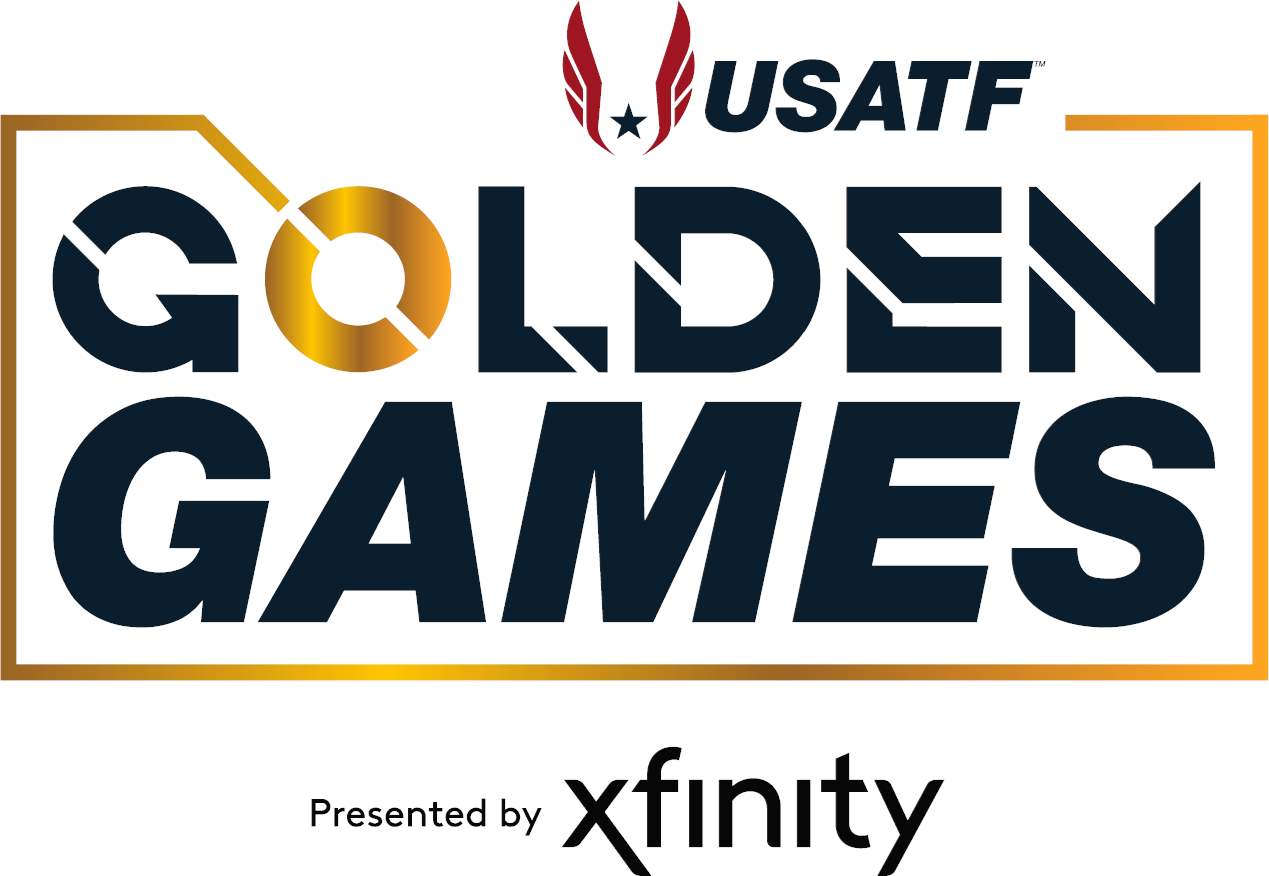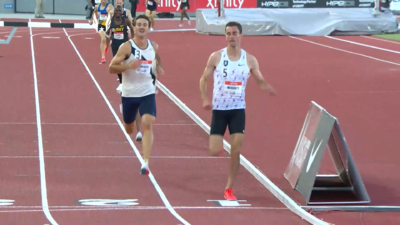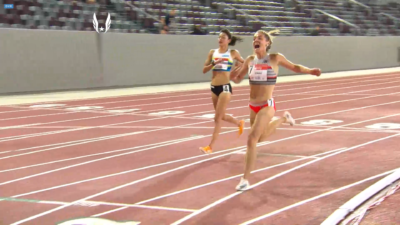Distance Night at Mt. SAC: Sean McGorty (8:20) Dazzles in Steeple Debut as Evan Jager Paces and Molly Huddle Struggles
By Jonathan Gault
May 9, 2021
It took almost two years for Sean McGorty to make his steeplechase debut.
It was worth the wait.
Running on the same track where his teammate Evan Jager made his debut nine years ago, McGorty — who was paced by Jager in this race through two kilometers — ran 8:20.77 to smash his first career steeplechase, knocking out the 8:22.00 Olympic standard and holding off a charging Dan Michalski to win the USATF Golden Games at Mt. SAC on Sunday night.
McGorty, the 2018 NCAA 5,000m champion at Stanford, had initially planned on trying out the steeple in 2019, his first full year as a professional with the Bowerman Track Club, but he wound up missing almost the entire season due to a mysterious (and serious) infection in his foot, which required multiple surgeries. McGorty was healthy in 2020, but the lack of access to facilities meant there were no steeples for him to race that year either (though he did manage an 8:25 time trial at the end of the summer). Which meant McGorty had to wait until Sunday night — 43 days before the first round of the men’s steeple at the US Olympic Trials — to run his first real race over barriers.
It could scarcely have gone better. McGorty snuck under the 8:22.00 Olympic standard, becoming the sixth American to achieve the mark during this Olympic cycle (Michalski quickly joined him as the seventh), won the race, and even beat Jager’s debut time from 2012 (8:26.14). Perhaps most importantly, McGorty did not look out of place in an event he has never run competitively. His comfort over the barriers, paired with his impressive flat pbs (3:36/7:37/13:06) make him an immediate contender for a spot on this year’s US Olympic team.
After the race, McGorty said he hasn’t 100% decided which event to run at next month’s Olympic Trials — the 5,000/steeple double is doable — but he appears to be leaning toward the steeple.
“We just wanted to see if this was an option,” McGorty said. “And I think right now, it does seem like it’s a card maybe we want to play in June.”
Behind McGorty, the next three men also PR’d. Michalski, who ran collegiately at Indiana and led the 2019 NCAA steeple until wiping out on the final water jump, went from 8:29.83 to 8:21.25. 2018 NCAA champ Obsa Ali took .14 off his pb from the USATF Grand Prix two weeks ago to run 8:22.67. And Benard Keter, who was 4th at USAs in 2019, went from 8:29.94 to 8:26.13.
One man who did not PR was American record holder Evan Jager. In fact, the 32-year-old Jager, entered in his first steeple since 2018, did not even finish; he was a pre-planned DNF, dropping out at 2k once his pacing duties were over.
In the other distance races on Sunday night, women’s American record holder Courtney Frerichs ran her first steeple since taking 6th at the 2019 World Championships and won in 9:27.70, leading Leah Falland (2nd, 9:28.72) and Marisa Howard (3rd, 9:29.65) under the Olympic standard. Julie-Anne Staehli of Canada won a thrilling women’s 5,000m by running a 22-second pb of 15:02, while on the men’s side, Mason Ferlic continued his terrific 2021 campaign by winning in a personal best of 13:24.94.The biggest story out of the 5000s may have come from someone who didn’t run well: 36-year-old Molly Huddle only managed a 15:23.24 in the women’s race.
Results and analysis of all races below. Full results can be found here.
Quick Take: Would you bet against Sean McGorty making the Olympic team?
McGorty’s flat personal bests are a lot faster than almost every other steepler in the United States; his 13:06 pb at 5,000m places him 17th on the all-time US list, and of the 16 men above him, only one of them has ever seriously run the steeple. That would be Jager — who is the greatest American steepler of all time.
That talent is a huge advantage to McGorty in the steeple — provided he can navigate the barriers, which is no simple task. But McGorty made it look pretty simple tonight, running a smooth race and looking fantastic after taking the lead with 200 meters to go. He may not go on to run 8:00 like Jager, but he has a strong chance to replicate Jager’s 2012 path, in which Jager went from never having run a steeple in April to the Olympics in August.
Quick Take: Evan Jager not racing tonight was…odd
An hour before the race, USATF tweeted out the news that Jager would be pacing tonight’s race instead of racing it, which seems rather strange considering we are six weeks away from the Olympic Trials, Jager hasn’t raced a steeple in three years, and, most importantly, he still needs the Olympic standard.
Jager can still get the standard at the Trials, and he’ll need to be in sub-8:22 shape in order to make the team (he doesn’t have a qualifying time for the Trials either, but USATF accepts anyone who has a World Championship medal in the previous four calendar years and Jager medalled at the 2017 Worlds). But choosing to pace rather than race when he hasn’t finished a steeple in three years is a curious choice, to say the least.
Quick Take: Props to Dan Michalski
McGorty’s run overshadowed a fine effort from Michalski, whose story does not deserve to be overlooked. The 2017 NCAA DII champion at Cedarville (Ohio) University, Michalski did a grad year at Indiana and was one bad water jump away from winning the NCAA DI title in 2019. Now he’s balancing a job as the head cross country coach at DIII LeTourneau University in Texas while chasing his Olympic dream. He took one big step toward that dream tonight by hitting the Olympic standard and almost running down McGorty in the home straight.
Women’s 5,000m
Quick Take: What an incredible race
The women’s 5,000m didn’t have the star power of some of the races shown during this afternoon’s national broadcast window on NBC. But make no mistake: this was the best race of the day. Through 3k (9:12.09), the leaders were on 15:20 pace and the Olympic standard of 15:10 appeared to be slipping away. That’s when Canada’s Julie-Anne Staehli went to the front and began ripping off 71-second laps. Staehli’s hard work righted the ship, but it looked as if she would have to settle for second after Mexico’s Laura Galvan Rodriguez passed her shortly after the bell.
Not so fast. Staehli hung on and then, grinding as if her life depended on it, ran down Galvan Rodriguez after she left lane one wide open on the home straight. Staehli, exultant, crossed in 15:02.34, a humongous improvement on her 15:24.66 pb, set just last week at the Kansas City Qualifier.
Galvan Rodriguez won’t be too upset. Her 15:02.48 took nine seconds off her previous pb of 15:11.35 — also set in Kansas City last weekend — and also broke Adriana Fernandez Miranda’s Mexican record of 15:04.32 set in 2003. There were two more big pbs behind them as Canada’s Natalia Hawthorn ran 15:05.91 for third (previous pb: 15:18.67) and Great Britain’s Jessica Judd ran 15:06.02 for fourth (previous pb: 15:16.47).
Quick Take: Molly Huddle is a shadow of her former self
Two-time Olympian Molly Huddle, who won the 5000 and 10,000 at the 2016 US Trials, was not good tonight. After dropping out of a 5000 in early April, Huddle recorded a finish but 15:23.42 isn’t good for the 36-year-old Huddle. For context, Elise Cranny and Karissa Schweizer basically ran back-to-back 15:23’s in their 10,000m in February.
In fact, Huddle hasn’t run that slow in a 5000 where she didn’t advance to the next round since 2011, when she ran 15:42 in the first round of the Daegu Worlds. The odds of her making the US Olympic team seem quite poor.
Women’s steeple
Quick Take: Courtney Frerichs returns, Leah Falland continues her resurgence
Frerichs’ winning time of 9:27 won’t turn any heads, but that wasn’t the intention tonight. Returning to the steeple for the first time in 18 months, Frerichs hadn’t run over a barrier until just before the race tonight but still won the race. Her goal was simply to get a feel for the event again before the Olympic Trials, and on that front, it was mission accomplished.
“The plan was just to get back into the steeple,” Frerichs said. “…I know I’m really fit, and I know my goal [later in the season] is much faster than that, but I think with how I ran the 9:27, it’s a starting point, and that’s all I wanted today.”
Behind her, 2014 NCAA champ Leah Falland closed well — she and Frerichs had identical 71.11 last laps — and continued her upward trend in 2021. Falland ran 9:44 and 9:32 to win her first two steeples of the year, and tonight she accomplished a major goal in hitting the Olympic standard and running 9:28, her fastest time since May 2016. Marisa Howard — the NCAA runner-up behind O’Connor in 2014 — also just got under the standard at 9:29. With Falland and Howard joining Frerichs, Emma Coburn, Colleen Quigley, and Mel Lawrence, the US now has six women with the Olympic standard.
Our recap of the day action is here: LRC USATF Golden Games Recap: Elle Purrier Breaks 4:00, Sha’Carri Richardson Runs 10.7 (Twice) and Says She’s Not Done Yet
Talk about the meet on our world famous messageboard / fan forum.
- USATF Golden Games at Mt.Sac official discussion thread
- DK METCALF 10.37 – Rojo nailed it
- Jager only rabbits 2000m of the steeple has bruise? on his shoulder
- Purrier’s Sunglasses @ Mt SAC
- Does running a 3:33 1500 show that Knight is a medal threat at the 5k?
- What the hell is up with Craig Engels?
- Is Pete Julien a bad coach?
- Jeff Eisenberg is a Fool– re: Metcalf speed
- Ritz Talks A Big Game… Just Like Rosario…..
- Brazier Scratches Mt. Sac – Showdown with Hoppel, Murphy OFF





